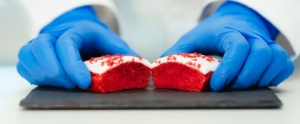Friday, 16 January 2026
Curcumin Study Demonstrates Positive Results for Gastrointestinal Barrier Maintenance
The study was the first to examine Meriva’s potential on system-level physiology responses during exertional heat stress. A new, double-blind, placebo-controlled, human study revealed that short-term dietary supplementation with curcumin…

The study was the first to examine Meriva’s potential on system-level physiology responses during exertional heat stress.
A new, double-blind, placebo-controlled, human study revealed that short-term dietary supplementation with curcumin may be helpful in the maintenance of the gastrointestinal barrier integrity and physiological strain responses during exertional heat stress. The study was conducted independently by a team of American researchers at the High Point University (NC) and published in The Journal of Applied Physiology.
The study examined an acute supplementation regimen, where participants ingested 5 tablets (500 mg each) of Meriva curcumin or placebo for three days prior to exertional heat stress(EHS). This dosing strategy was selected with reference to those used in two recent clinical studies demonstrating the positive effects of Meriva on healthy inflammatory responses to endurance cycling (Sciberras JN et al., Journal of the International Society of Sports Nutrition, 2015) and on reducing inflammatory cytokines in circulation (McFarlin BK et al.BBA Clinical, 2016).
“Several scientific studies reveal that exercise-heat stress increases gastrointestinal damage and risk of exertional heatstroke. This happens because during prolonged endurance exercise blood flow is mainly diverted towards skeletal muscle and skin,” commented Antonella Riva, Product Research Manager Indena. “These new positive human data confirm and expand our current findings on Meriva in sport nutrition, thanks to its outstanding performance in the maintenance of healthy inflammatory levels related to physiological mechanisms occurring during physical activities through the protection of gastrointestinal system.”
Technology
Bringing PFAS testing to the point of need
Jan 16, 2026 | Australia
Study finds Magtein enhances memory, reaction time and heart health markers
Jan 15, 2026 | Company News
Walmart and Google turn AI discovery into effortless shopping experiences
Jan 15, 2026 | Company News
Food Testing
Bringing PFAS testing to the point of need
Jan 16, 2026 | Australia
IMCD opens a Food & Nutrition Laboratory in Cologne
Jan 08, 2026 | Company News
La Trobe University Develops Portable Biosensor to Detect PFAS in Water
Jan 08, 2026 | Australia
More Popular
Amar Pure Gold to invest Rs 250 Cr in Agro-Food Park in Himachal Pradesh
Jan 16, 2026 | Company News
Franke launches new A Line in Southeast Asia and opens regional flagship showroom in Singapore
Jan 16, 2026 | Beverages
EXBERRY plant-based colour supplier GNT earns top sustainability award
Jan 16, 2026 | Awards





